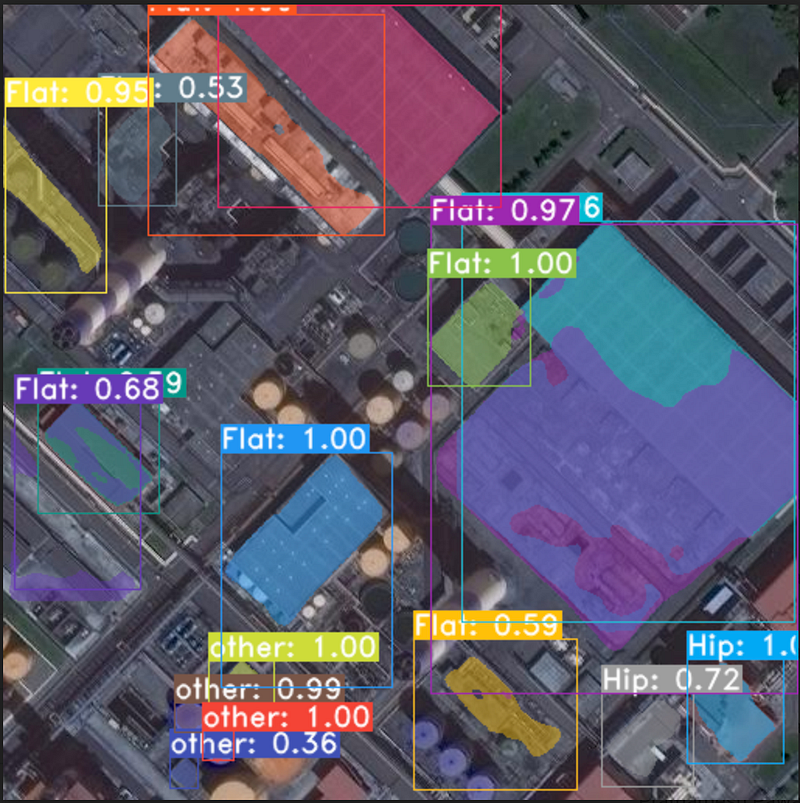Increasing Solar Energy Adoption Through AI Roof Detection

Background
The rooftop solar industry faces significant barriers due to the time-consuming and costly assessment process. Calculating the solar potential of a rooftop can take from an hour to two full days, contributing to sales costs that make up 30–40% of total project expenses. This inefficiency hinders the widespread adoption of solar energy, making the transition to renewable energy more challenging. Solar AI, a Singapore based startup incubated as a part of ENGIE Factory, collaborated with Omdena, sought to address this challenge by utilizing AI roof detection to streamline rooftop solar assessments, reduce costs, and accelerate the adoption of solar energy.
Objective
The AI roof detection project aimed to:
- Modernize the rooftop solar assessment process using AI in solar energy.
- Develop a reliable, automated pipeline for detecting rooftop features, calculating usable rooftop areas, and identifying obstacles.
- Improve cost-efficiency, making solar energy more accessible to building owners and solar energy companies.
- Support global sustainability goals by promoting the deployment of renewable energy.
Approach
To tackle this challenge, the team undertook the following steps:
- Data Collection and Annotation: Annotated thousands of rooftop images to create a high-quality dataset for supervised learning algorithms. This structured dataset became the foundation for training computer vision models.
- Model Development: Implemented cutting-edge machine learning models such as Mask R-CNN, YOLACT, and Detectron2 to detect rooftops and classify them by type (e.g., flat, hip, or shed roofs). The models also generated bounding boxes and mask contours for rooftops.
- Attribute Analysis: Extracted detailed rooftop attributes, including:
- Obstacle detection to identify features like chimneys or vents.
- Calculation of usable roof area by excluding obstacles.
- Classification of roof material and slope orientation.
- Automated Pipeline: Integrated these features into a robust automated pipeline, refining the process through iterative testing and evaluation.

Source: Omdena
Results and Impact
The AI roof detection project achieved significant milestones:
- Enhanced Efficiency: Reduced the rooftop assessment time from days to minutes.
- Cost Savings: Lowered sales costs for rooftop solar projects, making solar energy installations more economically viable.
- Accurate Analysis: Delivered precise rooftop data, including effective usable areas, slope orientation, and obstacle detection, to support solar energy deployment.
- Alignment with Sustainability Goals: Contributed to the United Nations Sustainable Development Goal 7 by promoting access to affordable, reliable, and sustainable energy solutions.
- Scalability: Enabled solar companies to scale their operations by leveraging AI-driven insights, hyper-scaling the transition to renewables.
Future Implications
The success of this project highlights the transformative potential of AI in solar energy. Future applications could include:
- Expanding the AI roof detection model to accommodate diverse building structures globally.
- Enhancing predictive analytics for solar performance based on location-specific factors.
- Driving policies to incentivize the adoption of AI-driven solutions in the renewable energy sector.
- Encouraging further collaboration between AI innovators and the solar industry to accelerate the global transition to renewable energy.
By demonstrating how AI roof detection can revolutionize rooftop solar deployment, Solar AI and Omdena pave the way for a sustainable, renewable energy future.
This project has been hosted with our friends at



Become an Omdena Collaborator



